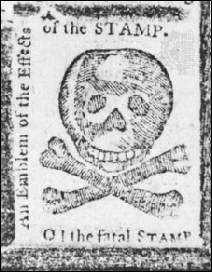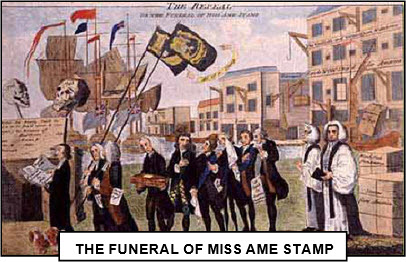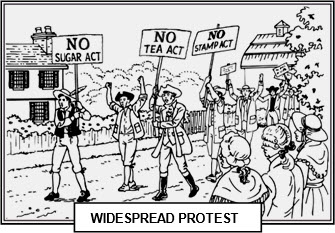


THE STAMP ACT 1765 (G3a)
xxxxxIn 1765, just two years after the Treaty of Paris, the Stamp Act, taxing the American colonies to help pay for their defence, caused widespread rioting. Many refused to use the stamps -
 xxxxxAs we have seen, the Treaty of Paris of 1763, favourable though it certainly was for Britain and her growing empire, contained one or two worrying aspects for the British parliament. First and, at this time foremost, was the huge war debt that Britain had accumulated during the seven years' of struggle, estimated at £114 million. There was a pressing need to reduce it. The second was the fact that the removal of the French menace in North America had made the colonies there much less dependent upon the mother country in the matter of defence. Following the signing of the treaty, it must be said, there was no serious talk of independence and no movement to that effect on the other side of the Atlantic, but should disagreement develop between Britain and her American colonies, then the possibility was always there.
xxxxxAs we have seen, the Treaty of Paris of 1763, favourable though it certainly was for Britain and her growing empire, contained one or two worrying aspects for the British parliament. First and, at this time foremost, was the huge war debt that Britain had accumulated during the seven years' of struggle, estimated at £114 million. There was a pressing need to reduce it. The second was the fact that the removal of the French menace in North America had made the colonies there much less dependent upon the mother country in the matter of defence. Following the signing of the treaty, it must be said, there was no serious talk of independence and no movement to that effect on the other side of the Atlantic, but should disagreement develop between Britain and her American colonies, then the possibility was always there.
xxxxxThat dispute was to come sooner than expected and, when it came, to be more embittered than expected. As we have seen, in the same year as the Treaty of Paris, Britain had become suddenly embroiled in Pontiac's War, a co-
 xxxxxWith this in mind, the British Chancellor of the Exchequer, Sir George Grenville, had already introduced a Sugar Act in 1764 to raise revenue, and this had met with but limited opposition. In March of 1765, however, when Parliament imposed the Stamp Act, the public response was quite different, and alarmingly so. Rowdy and sometimes violent protests broke out all over the colonies on the grounds that an Englishmen could only be taxed through his own representative assembly. In short, the slogan said it all: "No taxation without representation". To reinforce their argument, a large number of the colonists refused to use the stamps, and many burnt them in public. At ports up and down the coast a blockade was imposed on British merchant shipping. On the more diplomatic front, opposition was just as determined. The so-
xxxxxWith this in mind, the British Chancellor of the Exchequer, Sir George Grenville, had already introduced a Sugar Act in 1764 to raise revenue, and this had met with but limited opposition. In March of 1765, however, when Parliament imposed the Stamp Act, the public response was quite different, and alarmingly so. Rowdy and sometimes violent protests broke out all over the colonies on the grounds that an Englishmen could only be taxed through his own representative assembly. In short, the slogan said it all: "No taxation without representation". To reinforce their argument, a large number of the colonists refused to use the stamps, and many burnt them in public. At ports up and down the coast a blockade was imposed on British merchant shipping. On the more diplomatic front, opposition was just as determined. The so-
 xxxxxThe British government was totally taken aback by this extraordinary wave of protest. The act in question, which, by means of an official "stamp", simply placed a tax on all publications and legal documents, was a common revenue device in England. Furthermore, the colonies had been consulted and had offered no alternative solutions. William Pitt, nonetheless, spoke out in favour of the colonists, arguing for "imperial liberty", as did the American politician Benjamin Franklin when answering questions in the House of Commons. Eventually, Parliament, bowing to pressure -
xxxxxThe British government was totally taken aback by this extraordinary wave of protest. The act in question, which, by means of an official "stamp", simply placed a tax on all publications and legal documents, was a common revenue device in England. Furthermore, the colonies had been consulted and had offered no alternative solutions. William Pitt, nonetheless, spoke out in favour of the colonists, arguing for "imperial liberty", as did the American politician Benjamin Franklin when answering questions in the House of Commons. Eventually, Parliament, bowing to pressure -
xxxxxThe repeal clearly took the heat out of the situation, and matters calmed down somewhat. However, the Declaratory Act -
Acknowledgements
Stamp: from the The Pennsylvania Journal, 1764 – Rare Books and Manuscripts Division. New York Public Library. Cartoon: 1766, artist unknown, subsequently coloured -
G3a-


